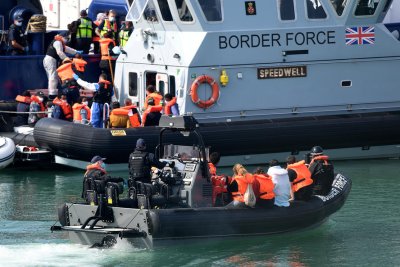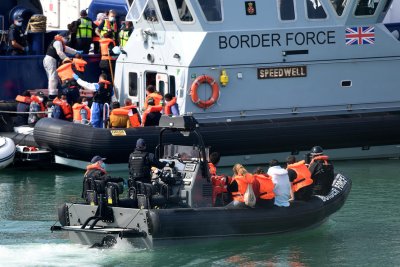
Britain began detaining migrants arriving on small boats from France under a deal in which one migrant who arrives without permission is returned for each migrant with an asylum claim or visa application legally lodged in France that Britain accepts. File photo by Andy Rain/EPA-EFE
Aug. 7 (UPI) — A landmark Anglo-French “one-in, one-out” migrant agreement saw the first small boat arrivals on the British coast taken into custody in preparation for being returned to France, the government said Thursday.
The detentions got underway on Wednesday with migrants who had crossed the Channel “illegally” held in secure immigration centers pending their removal to France, which was expected to take place in a matter of weeks, according to a Home Office news release.
It pledged full transparency, saying detainees would be briefed on the process for returning them to France and kept updated on their progress through the system on an individual basis.
For each migrant sent back, Britain will take in one pre-approved to claim asylum who has not previously attempted to enter the country and who has completed a formal application and security clearance process in France that is only open to those with a passport or identity document.
Pre-checked individuals, or family groups, will then journey safely from France via scheduled rail, ferry or airline services.
Home Secretary Yvette Cooper declined to say how many migrants had been detained but vowed to fight any challenge launched in the courts in an attempt to block them from being sent back to France.
“The transfers to immigration removal centers are underway as we speak, so we won’t provide operational details at this point that criminal gangs can simply use and exploit. But no one should be in any doubt: anyone who arrives from now on is eligible for immediate detention and return,” she said.
Cooper added that it was the very early stages of a pilot that would take time to scale up, but stressed, given that France was a safe country for all, including migrants, the government would “robustly defend against any legal challenge that people try.”
However, Home Office sources told The Guardian that the scheme inked last month during a state visit to Britain by French President Emmanuel Macron would initially only involve about 50 asylum seekers.
Immigration lawyers warned that the ambiguous terms of the treaty left it open to legal challenge by individuals trying to prevent their removal from the country.
At least one charity cautioned that the scheme shut out people fleeing war or famine in countries including Eritrea or Sudan because they were unlikely to meet the criteria for official identification.
“This week in Calais, we spoke with many people from Eritrea and almost none of them have copies of their Eritrean passports because they were never able to obtain one,” said a spokesperson for Refugee Legal Support.
The spokesperson said the largest group making the journey across the Channel so far this year were Eritreans, 86% of whom had their refugee claims upheld once they reached Britain — but virtually all of them would never get that chance under the scheme.
The deal, marking the first time Britain has been able to return migrants who arrive from France, came as the number of people crossing the Channel in small boats in the first seven months of 2025 topped a record 25,436.
Under the treaty, Britain is responsible for the costs of transporting migrants in both directions, and France is entitled to refuse to accept returnees it believes pose “a threat to public policy, internal security, public health or the international relations of any of the Schengen states.”
Schengen states refer to the borderless, free travel area comprising 25 of 27 member countries of the European Union plus Iceland, Liechtenstein, Norway and Switzerland.
